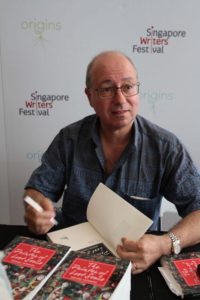I have followed with interest the lively debate on cultural appropriation triggered by Lionel Shriver’s address at the Brisbane Writers Festival in September. Shriver’s strident defence of freely assuming other identities for the purpose of writing fiction unleashed a storm of protest from those who regard the boundaries of race, religion and gender as ring-fenced – ‘look-but-don’t-touch’, as she put it.
Should writers be afraid of what Shriver calls ‘a larger climate of super-sensitivity, giving rise to proliferating prohibitions supposedly in the interest of social justice that constrain fiction writers’? If we consider the larger body of modern classical writing in the 20th century, they certainly have not. Should André Malraux have worried about portraying the tortured life of the Chinese assassin Chen in revolutionary Shanghai in his 1933 classic Man’s Fate? When Joseph Conrad wove an adventure story around James Wait, a West Indian sailor in Nigger of the Narcissus, this was not regarded as cultural misappropriation, but as a brilliant work of fictional realism – despite the unfortunate title. Both Conrad and Malraux, to take but two examples, used their writing to bring what were then remote and different parts of the world alive in the minds of their readers, narrowing yawning cultural chasms by revealing the essential humanity of their subjects.
Similarly, I write fiction to escape the bonds of cultural constraint, and use fictional characters and situations to bore more deeply into the cultures I have inhabited and studied for the past thirty years. As a writer born in the West who has published two novels set in Indonesia and many short stories set in Southeast Asia, I have written from cultural perspectives that are plainly not my own, assumed identities for my characters that are clearly not Western, and told stories that have no bearing on the world in which I was raised in the United States and England. I did all of this without permission.
I hope my stories are at least in part transcendent, provide a form of escapism, yet also stir thematically the ideals of freedom and social justice. Most readers have told me the stories – set in remote islands, villages and cities as well as courts and palaces across Southeast Asia – offer a way to understand these various cultures and societies, and highlight the struggles within them. No one has yet wondered if my novel The Painter of Lost Souls – about a Javanese painter who becomes entangled in the struggle between secular expression and Islamic dogma – was a story I had any right to tell: I am neither a Muslim nor a painter. Likewise, no one has yet questioned my right, in Spice Garden, to narrate through the eyes of a Muslim trader and a Catholic priest the story of violent religious conflict in the Moluccan islands.
My own identity is somewhat blurred. I grew up a white male in an orthodox Anglo-Saxon setting but with my family’s origins steeped in the colonial context of the Levant. I suppose I could have ended up writing exclusively about the taunts and bullying I experienced in British schools because of my foreign name. Born in the US and brought up in Britain, I might have become obsessed with the strong sense that I would never quite be considered either an Englishman or an American. Lacking the multi-lingual skills my parents acquired from their upbringing in cosmopolitan Palestine and Egypt, I could not even take refuge in the land of my ancestors. As a passive Christian with antecedents who were both Jews and Muslims, religion for me became a basket of contradictions.
Dwelling on these issues as a writer would have made me feel more alienated, not less; and also highlight my inauthenticity in any of these areas. I therefore found security in a context so profoundly foreign that, like the migrant arriving in a place of refuge, I appropriated it as my home. This allowed me to put some distance between that and my own insecurity as I grew up in an intolerant society: it gave me a sense of perspective on how much more fortunate I actually was and made me a more useful person. As a result, I believe culture can and should be appropriated – because it makes for a less combustible society.
We live in an iconoclastic age where everything is questioned and the norms and values we once respected are being up-ended. Much has been written about how this stems from the frustration of those who feel shut out, abandoned and let down by globalisation. It is hard to disagree with this as a generalisation, but there’s a more insidious impulse. For in a world where everyone has a voice, where millions of people in just a few seconds can read the tiniest brain-fart, there is a frantic, existential desire to stand out and be noticed. It seems to me that part of the problem is that indignant displays of prejudice and outrage easily grab and gain attention in an era when the megaphone has been replaced by instantly broadcast social media. As a result, boundaries proliferate: no-go areas emerge, differentiation becomes packaged and commoditized, tragedy and misfortune become trajectories to wealth and fame.
Perhaps a story I wrote some years ago about the behaviour of the elderly Thai-Chinese residents of a retirement home in Bangkok could earn me multiple levels of opprobrium in the modern context. My description of the impact of modern urban growth on traditional family values might be seen today as encroaching on the privacy of the elderly and impugning the tradition of filial piety.
The writer struggling to rise above conflict and cut through human confusion is often victimized, either for not taking sides or for telling inconvenient truths. Albert Camus once said that writing is ‘a means of stirring the greatest number of people by offering them a privileged picture of common joys and sufferings’. I strongly agree with Lionel Shriver that ‘even if novels and short stories only do so by creating an illusion, fiction helps to fell the exasperating barriers between us, and for a short while allows us to behold the astonishing reality of other people.’ Who has the right to decree that culture and gender must be fenced-off areas? Shouldn’t any serious writing be allowed to trespass aggressively, so long as people’s identities are respected? Isn’t it more fraught to proscribe or deny such voices? To put my response in another, more inappropriate way: Appropriate my ass!
First published in Asia Literary Review, 18th October 2016

